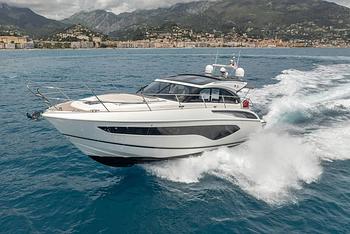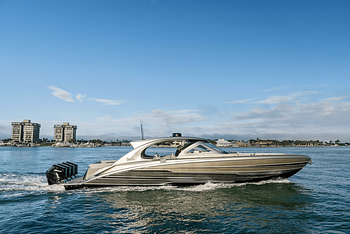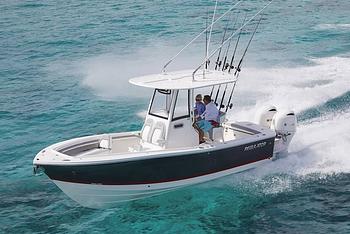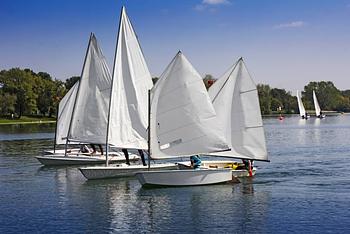Which is better, a deck boat vs pontoon boat? We take an in-depth look at the difference between the two.
The main difference between a deck boat and a pontoon boat can be found in one simple technical factor: deck boats have a single rigid hull, while pontoon boats have a deck riding on pontoons that act as the hulls. Beyond this, the two boats serve relatively similar functions and niches in the boating world, yet there are numerous details that can make one or the other the best choice for different people. Which will be the best choice for you and your family? To answer that question, let’s take a deep dive into the deck boat vs pontoon comparison.
Differences Between Deck Boats and Pontoon Boats
As we mentioned, along with the different hulls there are lots of things that set these types of boats apart. One big potential difference is that most deck boats are constructed of fiberglass, while most of the pontoon boats for sale on today’s market are made from aluminum. We say potential, however, because there are some exceptions. In a number of cases you’ll see aluminum deck boats and on rare occasions you’ll also find a fiberglass pontoon boat—although generally the “pontoons” and the bridge between them consist of one molded part, which arguably could make them power catamarans.
If you look at overhead pictures or layout drawings of a deck boat vs a pontoon boat, in some cases it can be tough to tell the difference. So beyond construction materials, what else sets these two types of boats apart? Let's look through the lens of the pros and cons between deck boats and pontoons.
Deck boat pros
- The larger surface area of a deck boat’s single hull provides more buoyancy, so deck boats are better weight-bearing platforms and commonly have higher weight and passenger capacities.
- Deck boats tend to handle large waves better, in part because they have more buoyancy in the bow.
- Most deck boats have a sportier feel to their handling than pontoon boats.
- Deck boats have more integrated features (like built-in seat bases, coolers, and consoles), as opposed to bolted-on accessories. This means less squeaking and creaking when running through waves, and it helps improve longevity.
- Choosing a deck boat can be easier, because there tend to be fewer available layouts.
- Many people feel that the look of slick gel coat is much better than those of bare or painted aluminum.
Deck boat cons
- Due to the fiberglass construction, deck boats commonly weigh more than pontoon boats—sometimes a lot more. (Aluminum models may be an exception.)
- Deck boats offer much more limited choice when it comes to layouts.
- Fiberglass boats need waxing, and that includes deck boats.
- Molded fiberglass gunwales are wider than aluminum fences, and some deck boats narrow a bit towards the bow, so pontoons of equal length and beam often have a bit more room inside.
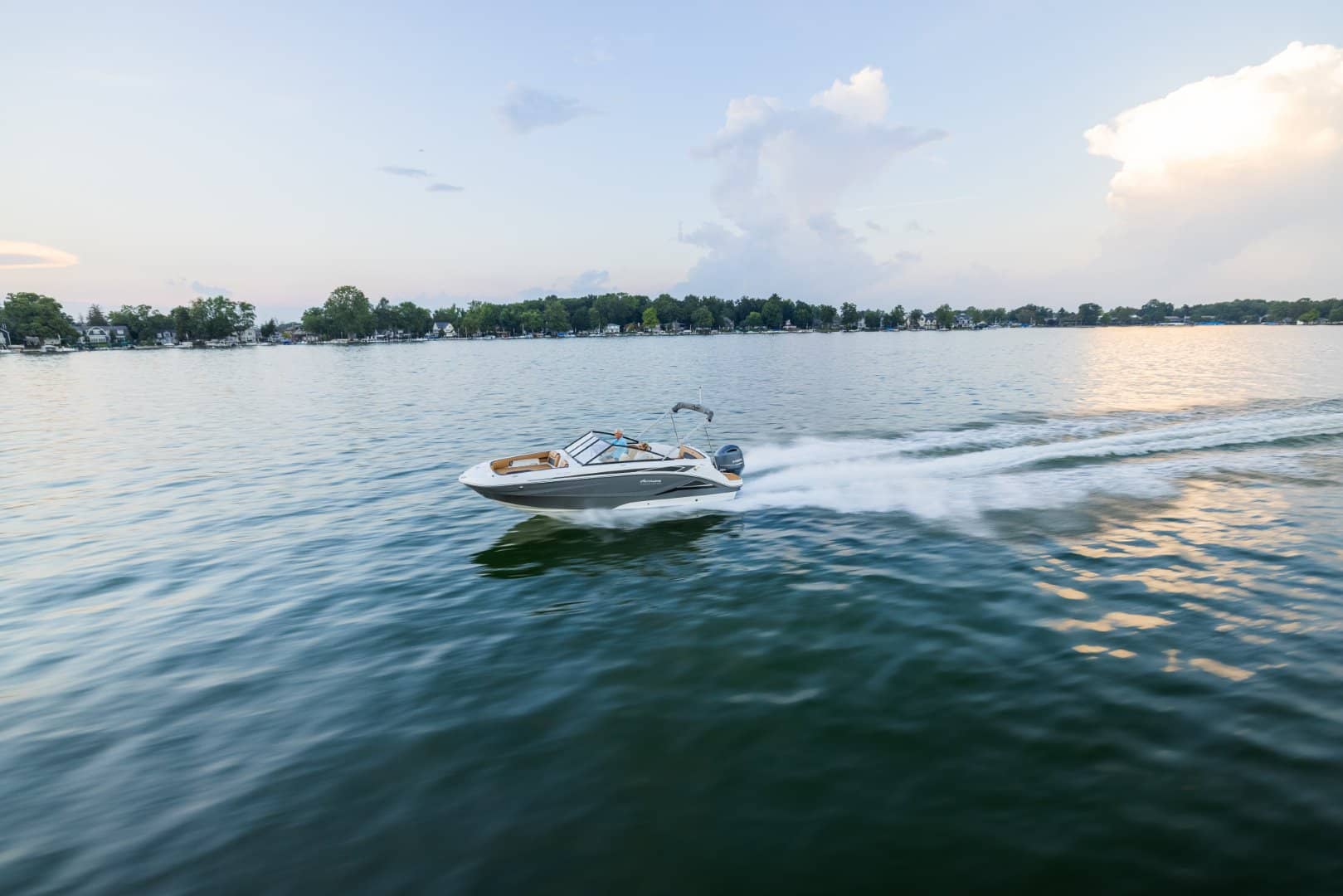
Photo credit: Hurricane Boats
Pontoon boat pros
- Pontoon boats offer the ultimate in choice and semi-customization. In many cases, you’ll have a dozen or more furniture layouts to choose from in a single model line.
- Many pontoon boat manufacturers offer models in both pontoon and “tri-toon” forms (tri-toons have a third pontoon running down the middle), so you can opt to spend more or less depending on what level of performance you want.
- The tall “fences” surrounding the deck of a pontoon boat are great for keeping kids and pets secure.
- The lighter weight of pontoons means it’s possible to tow them with a smaller vehicle.
- Maintenance is limited to cleanup and fixing things that go wrong.
- Pontoon boats maximize usable space.
- Most pontoons have platforms at both bow and stern for boarding.
Pontoon boat cons
- Pontoon boats aren’t the best choice for rough water.
- The life expectancy of a pontoon boat is generally shorter than that of a molded fiberglass boat.
- Since most pontoons have rotomolded seat bases, which don’t fit as exactly as fiberglass parts, most of the storage areas aren’t entirely waterproof.
- Some pontoons are made strictly for freshwater use and parts may suffer from corrosion issues if used in saltwater environments.
- Because of the tall fences and shallow, rounded pontoons, pontoon boats can get caught by the wind and blown around more easily than many other types of boats.
- Handling tends to be less sporty than that of a monohull.

Deck Boat Vs. Pontoon Boat Performance
A boat’s performance is, of course, considered critical by many people. Deck boats generally hold a performance edge, especially in the way they carve sharp turns and crisply jump onto plane. And many can travel at up to highway speeds. That said, while pontoon boats from decades past were relegated to mushy handling and slow speeds, today many can rival a fiberglass monohull when it comes to sheer speed. As a rule, these will be tri-toon pontoon boats, because having the third “log,” as it’s called, beefs up the boat’s structural stability, adds buoyancy, and allows for the use of higher horsepower engines.
But not all boaters feel the need for speed. Some people plan to meander down a lake or river and aren’t in any rush, and for these folks, there are plenty of low-horsepower pontoon boats out there. These cost less, burn less fuel, and have lower maintenance costs. Most of the time you see deck boats for sale, on the other hand, they’ll be powered to cruise fast and low-horsepower options are few and far between.
Deck Boat Vs. Pontoon Rough Water Handling
Rough water handling is another area where deck boats have the edge, which is one of the reasons why you’ll see deck boats on all different types of waterways while pontoons are rarely seen outside of lakes, calm rivers, and relatively protected bays. Monohulls molded of fiberglass and their upswept bows tend to rise rather than being washed over, and their complex forms with V-shaped deadrise helps split open the waves. Plus, the weight of deck boats vs pontoon boats comes into play as well, since weight helps a boat push waves out of the way rather than being pushed by them. We have to note that tri-toons do have an advantage over pontoon boats with two logs, and can handle waves better than one might expect. Plus, many pontoons do a lot less rocking and rolling in a beam sea than the average deck boat. Still, when it comes to deck boat vs pontoon rough water handling, deck boats generally get the nod.

Photo credit: Lowe Boats
Deck Boat Vs. Pontoon Boat Safety
All boats built and sold in the United States must meet U.S. Coast Guard safety requirements, regardless of whether they’re deck boats or pontoons. And all boat manufacturers certified by the National Marine Manufacturer Association (NMMA) meet an even higher standard. Most deck boats are NMMA certified and the best pontoon boat brands are, too. So, this category is really a tie — both are really quite safe, as long as they’re captained by someone who is competent and exercises good judgment.
Deck Boat Vs. Pontoon Boat Space and Capacity
As we mentioned in the Pros and Cons, all other things being equal, pontoon boats do tend to have more interior volume since molded fiberglass boats have wider gunwales. And while a core trait of a deck boat is carrying its beam forward, some do narrow up a bit towards the bow, further reducing interior space. Consider though that while pontoon boats have more elbow room oftentimes deck boats are rated to carry a higher number of passengers and support more overall weight. Also note that some pontoon boat manufacturers offer different-sized logs, as well as the choice between two or three, which may also affect a boat’s capacity.

Photo credit: Starcraft Marine
Deck Boat Vs. Pontoon Boat Maintenance
All boats require maintenance, but generally speaking pontoon boats require less than deck boats (or for that matter any fiberglass boats), simply because the hull doesn’t need to be waxed. The same is true topsides, where any gel coated surface will need some rubbing and buffing a few times each season. Beyond that there aren’t too many major differences; both types of boats will need to be washed after use, the cushions and canvass will need cleaning, and the powerplant has to be regularly maintained.
Deck Boat Versus Pontoon: Price
When it comes to deck boat vs pontoon price, all bets are off — this is truly a matter of “you get what you pay for.” You can find deck boats that are relatively cheap, and others with a sticker price that will make you faint. And you can find pontoon boats that are easily affordable, as well as models that MSRP for the cost of a house. So, making a blanket statement about deck boat vs pontoon price is simply impossible.
What will end up in your driveway, a deck boat or a pontoon? It all depends on how much each of these advantages and disadvantages matter to you, personally. Then again, maybe your answer will be, “Both!”
Related Articles and Guides
19th Jul 2024
The World’s Best Yacht Brands
12th Jul 2024
Top Performance-Boat Brands, Where There’s Something For Everyone
28th Jun 2024
Best Center Console Boats: The Best Brands Across the Spectrum
23rd Jun 2024

